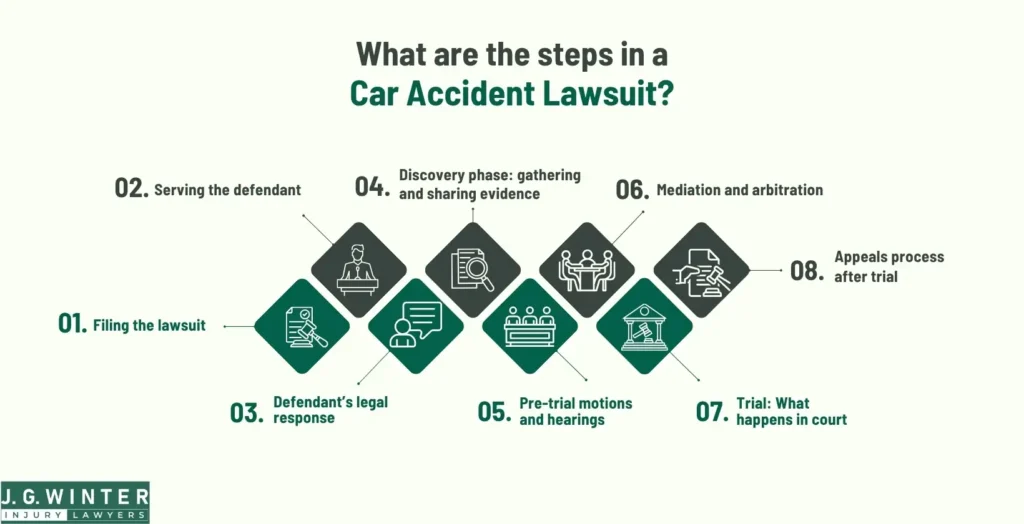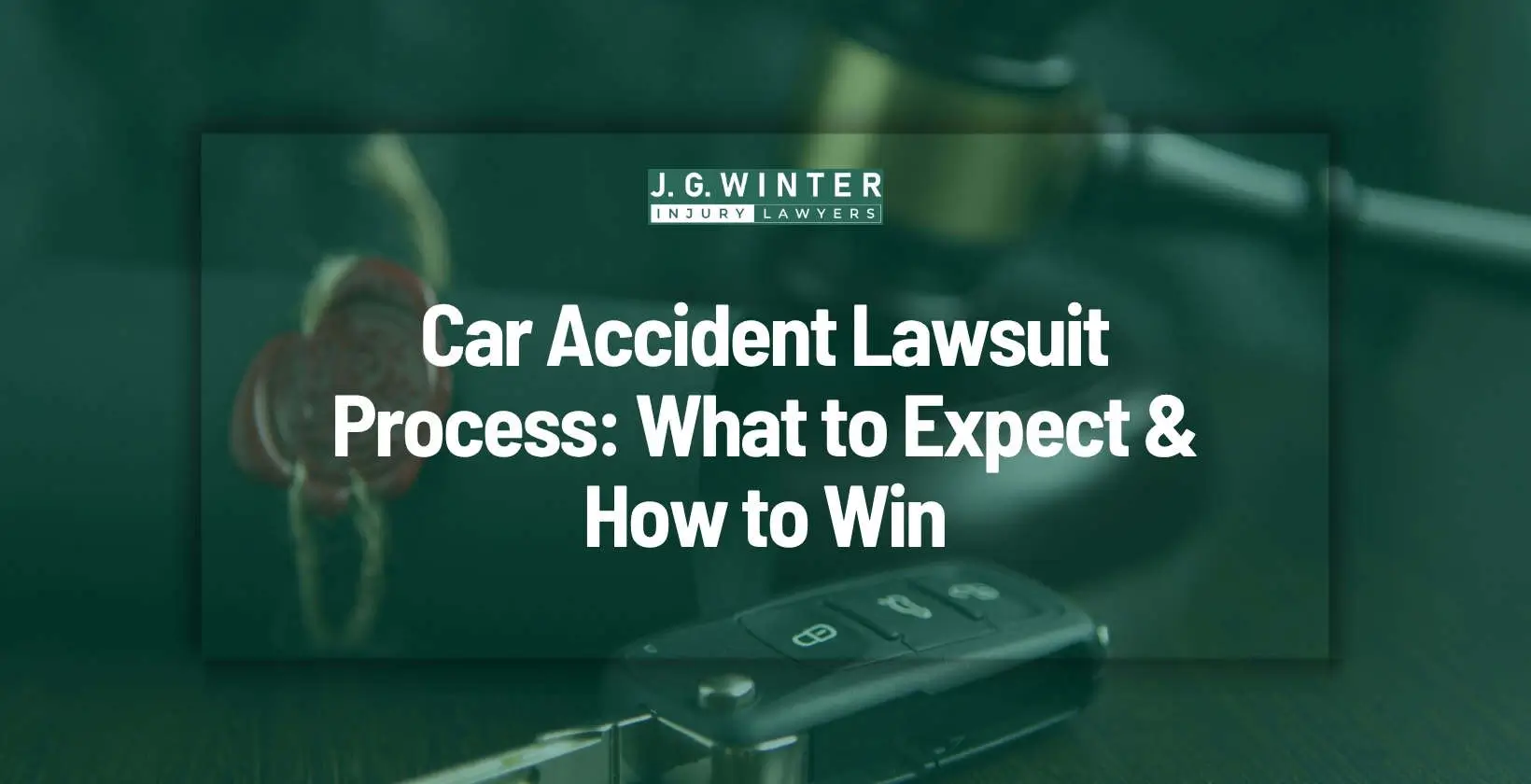Understanding the car accident lawsuit process from launch to landing gives you a greater degree of control over the outcome of your case. Every decision from day one, especially how you prepare and who you hire, directly factors into the end result. Whether the case ends in settlement or trial, legal strategy drives the outcome.
At J.G. Winter Law, we guide clients through complex auto injury lawsuits with clarity and care. You will get a clear picture of each phase, from filing to resolution, and learn which actions can make or break your claim.
What is the car accident lawsuit process?
A car accident lawsuit is a court case filed when an insurer denies, undervalues, or delays a valid claim. Lawsuits are used when liability is disputed or offers fail to cover losses.
Unlike insurance claims which are resolved by adjusters, lawsuits follow court procedures to pursue full compensation.
What qualifies as a car accident lawsuit?
A car accident may qualify for a lawsuit if the injury is serious, medical care is ongoing, or the insurer does not pay out fairly. Examples include:
- Cases involving uninsured drivers.
- Permanent disabilities or surgeries.
- Wrongful death or disputed fault.
How is a lawsuit different from an insurance claim?
| Insurance Claim | Lawsuit |
|---|---|
| Handled by the insurance company | Filed in court by an attorney. |
| Fast, informal process | Court-supervised resolution. |
| Short timeline (weeks to months) | Longer timeline (months to years). |
| Low cost, few steps | High cost, formal process. |
When does a claim escalate into a lawsuit?
A car accident claim typically progresses into a lawsuit action when the insurance company denies liability or makes an unreasonably low offer. For example, if an adjuster offers far less than your medical bills, legal action is a way to pursue full compensation.
Another reason is when the at-fault driver’s insurer delays the process or disputes over the fault in the accident. In wrongful death cases or where damages exceed policy limits, lawsuits are often necessary to secure just outcomes.
What are the steps in a car accident lawsuit?
Filing a car accident lawsuit starts a structured legal journey aimed at resolving disputes and securing fair compensation. Each step from the complaint to trial or appeal plays a key role in shaping the outcome, and understanding this process helps you stay prepared and informed.
Filing the lawsuit (the complaint)
A lawsuit begins when your attorney files a formal document called a complaint in civil court. This complaint outlines your legal claims, the damages you are seeking, and the party (or parties) you are aiming to hold responsible. Filing the complaint officially starts the legal process and sets deadlines in motion for the next stages.
Serving the defendant
After filing, the defendant must be served with a copy of the complaint and a court summons. This is usually done by a professional process server, sheriff, or certified mail. California law sets deadlines for service, and failure to serve properly can delay or dismiss your case.
Defendant’s legal response
Once served, the defendant must file a response called an “answer,” which may admit or deny the claims. They might raise defenses or even file counterclaims against you. This stage formally sets the issues that the court will resolve.
Discovery phase: gathering and sharing evidence
Discovery allows both sides to collect and exchange evidence through written questions (examination), depositions, and document requests. This phase helps build each side’s case and ensures no surprises at trial. Strong discovery is often the key to a favorable settlement or verdict.
Pre-trial motions and hearings
Lawyers may file motions such as a motion to dismiss or a motion for summary judgment to resolve the case or narrow the issues before trial. Judges may hold hearings to decide these motions, which can significantly impact the outcome of the case.
Mediation and arbitration
Mediation and arbitration are forms of alternative dispute resolution (ADR) that occur outside the courtroom. These methods are often faster and less costly than going to trial. Mediation involves negotiation with a neutral third party; arbitration is more like an informal trial with binding results.
Trial: What happens in court
If the case goes to trial, both sides present evidence, call witnesses, and make legal arguments. A judge or jury will then decide liability and award damages. Trials can last anywhere from a few days to several weeks, depending on the case’s complexity.
Appeals process after trial
If one side believes legal errors affected the verdict, they may file an appeal. Appeals review court procedures rather than re-trying the facts. They often take months to years to succeed and require a legal basis, such as improper jury instructions or evidentiary rulings.

How long does a car accident lawsuit take?
Most car accident lawsuits last between 12 and 24 months. Early settlements can close in under a year. Court delays or appeals can extend cases beyond the 2-year statute of limitations. The timeline depends on your case details, the court’s schedule, and how both sides cooperate.
Average duration for car accident lawsuits
Most car accident lawsuits in the U.S. take 12 to 24 months from filing to resolution. Cases that settle before trial often close in under a year, while those that go to court may extend beyond two years. Jury trials and appeals can significantly lengthen this timeline.
Factors that affect the timeline
The length of your case depends on several moving parts. Serious injuries, disputed liability, multiple parties, or a crowded court docket can all slow things down. On the other hand, when both sides cooperate and a fair settlement is possible early, the process often moves faster. Every case is different, but knowing these factors helps you set realistic expectations.
Fast-track vs. complex case timelines
Simple cases, such as rear-end collisions with clear liability, typically resolve within 6 to 9 months. In contrast, complex cases, such as those involving multi-vehicle crashes, commercial trucks, or serious injuries, may take 18 to 36 months, especially if litigation is required.
Should you file a lawsuit after your car accident?
Not every accident requires a lawsuit, but ones with certain criteria usually move in that direction. If your injuries are serious or the insurance company is not offering fair compensation, filing a lawsuit will be the right next step to protect your rights and secure the recovery you deserve.
Common scenarios that justify a lawsuit
Filing a lawsuit becomes necessary in cases involving uninsured drivers, denied or delayed insurance claims, or permanent injuries that lead to high medical costs. Other scenarios include when the at-fault party disputes liability or refuses to cooperate. These issues often require formal legal action to resolve fairly.
When settlement negotiations fail
Insurers may offer lowball settlements that do not reflect the full value of your claim. They might delay processing or question the severity of your injuries to reduce the payout. When negotiations stall or result in unfair offers, filing a lawsuit becomes a strongly recommended option to protect your best interests.
Injuries and damages that require legal action
When an accident leads to serious injuries, such as brain trauma, spinal damage, whiplash, or broken bones that require surgery, the financial and emotional toll is often too great for a standard insurance settlement to cover. Legal action becomes critical when your recovery involves long-term care, lost future income, or permanent disability. In these cases, a lawsuit is often the only path to full and fair compensation.
Can you sue if you were partially at fault?
Yes. You can sue if you share fault, depending on state law. In any personal injury case, such as a car accident, the central legal concept you must prove is negligence.
The two main systems used to resolve this are:
- Comparative negligence: Reduces payout based on fault share (this is applicable in Sacramento courts and across all of California).
- Contributory negligence: Any fault may bar recovery.
How much can you get from a car accident lawsuit?
The amount you can recover in a car accident lawsuit depends on several key factors: how serious your injuries are, who was at fault, and how effectively your lawyer builds your case. Settlements and verdicts can range from a few thousand dollars to several hundred thousand or more. Your final compensation reflects not just medical bills and lost income, but also future care needs, pain and suffering, and how the injury has negatively altered your life.
Typical payout ranges by injury type
Compensation depends on injuries, documentation, and insurance limits.
- Payouts range from $2,500 to over $500,000.
- Minor injuries: $2,500 – $25,000
- Moderate injuries: $25,000 – $100,000
- Severe injuries: $100,000 – $500,000+
Back, neck, and soft tissue injury examples
Settlements for neck, back, and soft tissue injuries often fall between $10,000 and $75,000. For example, a lower back strain with physical therapy may settle for around $15,000. More complex injuries like herniated discs requiring surgery can exceed $100,000, depending on recovery time and medical costs.
Non-injury settlement potential
Non-injury settlements usually involve property damage or emotional distresssuch as PTSD (Posttraumatic Stress Disorder). Vehicle damage claims can range from $1,500 to $15,000 based on repairs or total loss. Emotional distress, while harder to quantify (especially if not accompanied by physical injury), may yield $5,000-$25,000 depending on the severity of trauma and its documentation.
Factors that influence payout amounts
Several factors directly impact your settlement:
- Liability clarity: Strong evidence showing the other driver’s fault boosts payout.
- Legal representation: Skilled lawyers often negotiate higher settlements.
- Medical documentation: Detailed records help justify compensation.
- Insurance limits: Policy caps may restrict payout amounts.
- Long-term impact: Chronic pain or disability increases damage significantly.
What factors affect whether you win or lose?
Winning a car accident case comes down to the magnitude of your injuries, the clarity of fault, the quality of your evidence, and the effectiveness of your legal team in formulating your narrative and supporting arguments.
Here are the key elements that can determine success:
Severity of your injuries and financial damages
Serious injuries like broken bones or spinal trauma often lead to higher settlements because they show clear harm and high costs. Minor injuries with limited treatment usually result in smaller payouts. The greater the medical and financial loss, the stronger your case appears.
Clarity of liability
Clear liability, such as a rear-end collision with strong witness support, increases your chances of winning. If both parties dispute fault or the details are unclear, your chances of success decrease. Visual evidence or police reports that support your version of events are key.
Strength of your evidence
Winning cases rely on strong documentation. Essential evidence includes medical records, accident scene photos, police reports, and a timeline of treatment. The more organized and verifiable your proof, the harder it is for insurers or defense attorneys to challenge your claim.
Effectiveness of your legal representation
Lawyers with specific car accident experience often achieve better results than generalists. They understand accident laws, insurance tactics, and court procedures. A skilled and highly experienced legal team like ours at J.G. Winter can make the difference between a low offer and full compensation.
Insurance company’s defense tactics
Insurers often employ tactics such as blaming you for the crash, questioning the severity of your injury, or prolonging negotiations. These strategies reduce their payout risk. Anticipating and countering these defenses is crucial to protecting your settlement.
How much do car accident lawyers charge?
A car accident settlement is calculated by adding your economic and non-economic damages, then subtracting any insurance policy limits or caps. The final payout reflects both your tangible losses and the pain and turmoil you have undergone.
Economic damages: medical bills, lost wages
Economic damages include all financial losses directly caused by the accident. Here is a basic breakdown:
| Expense Type | Typical Value |
|---|---|
| Medical bills | $15,000-$50,000 |
| Lost wages | $1,000-$25,000( job-based) |
| Future income loss | Based on wage history and recovery. |
Non-economic damages: pain and suffering
Non-economic damages compensate for emotional and physical distress. These are often calculated using a multiplier (1.5-5x) of your economic damages or a per diem approach.
In the words of a recent client of ours: “The crash took more than my mobility, it shattered my sense of independence.”
Insurance limits, fault, and coverage caps
Settlement payouts cannot exceed the at-fault party’s insurance limits unless they have umbrella coverage or personal assets. For instance:
- With $50,000 liability coverage, your recovery is capped at that amount unless further assets are pursued.
- With umbrella insurance, your claim might access $1 million+ if warranted by the damages.
Fault percentages can also reduce payouts under comparative negligence laws.
What are the costs of filing a car accident lawsuit?
Filing a car accident lawsuit comes with expenses like court filing fees, document service charges, and expert witness reports. Fortunately, most personal injury lawyers including J.G. Winter Law work on a contingency fee basis, meaning you only pay if you win. In some cases, these costs may be reimbursed by the at-fault party as part of your settlement or judgment.
Empty heading
Do you pay upfront to file a lawsuit?
No. Most personal injury lawyers charge nothing up front. Contingency means you pay only if you win. However, out-of-pocket costs like court filing fees or document services may still apply during the process. Always confirm which costs are advanced or billed separately in your agreement.
Can you recover legal fees from the defendant?
Under the American Rule, each party usually pays its legal fees.
| Scenario | Can you recover fees? |
|---|---|
| Standard personal injury case. | No |
| Bad faith insurance denial (CA). | Yes (if statute allows) |
| Contract with fee-shifting clause. | Yes |
Certain California statutes allow recovery in cases involving bad faith or contract breaches. Always ask your lawyer about fee recovery eligibility.
What happens after a car accident lawsuit ends?
After a lawsuit is settled, the defendant pays the agreed-upon settlement or the court-awarded judgment. Your attorney deducts legal fees and case costs and resolves any medical liens. In most cases, personal injury settlements are not taxable. If either side appeals, the case can continue in a higher court before payment is finalized.
What if the defendant doesn’t pay?
Courts enforce judgments using financial recovery tools:
- Wage garnishment
- Bank levies
- Property liens
Lawyers will take further action to ensure payment. These court-approved legal steps are designed to assure conversion of a legal judgment into real compensation for the claimant.
Are lawsuit settlements taxable?
For lawsuit settlements, the tax implications depend entirely on the reason for the payment. According to the IRS, some parts of a settlement are taxable while others are not, based on the nature of the loss being compensated.
Not Taxable:
- Compensation for medical expenses
- Pain and suffering damages
Taxable:
- Lost wages
- Punitive damages
Always consult a tax advisor to understand how your specific settlement may be treated.
Do you need a lawyer for your car accident case?
Yes, in serious or disputed cases, retaining legal help has been shown to increase payouts. Lawyers understand legal steps, insurance tactics, and trial procedures. If your injuries are serious or liability is unclear, having a lawyer can protect your rights and increase your compensation.
What to look for in a car accident attorney?
Choose a personal injury lawyer with trial experience and favorable online ratings and testimonials in your local market. Check for transparent contingency terms and verify client results. Specialized attorneys secure higher payouts than generalists.
How J.G. Winter helps you maximize your lawsuit outcome?
J.G. Winter delivers local expertise and proven results for citizens of Sacramento, Folsom, and the greater Northern California region. With over 20 years of success in car accident cases, our firm negotiates, litigates, and secures millions in compensation for clients, covering medical bills, lost income, pain and suffering, and property damage.
Clients choose us because we treat every case like it matters: we care because we’ve been there. Contact us today.


